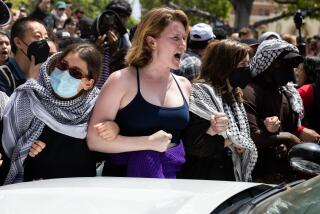Movie Reviews : A Personal View of the Vietnam-era on the Home Front
There’s an awkwardness, an aura of self-consciousness, about “1969” (citywide) that is finally more of a plus than a minus. It reflects writer-director Ernest Thompson’s sincere and determined attempt to grapple--in a deeply personal and autobiographical way--with the impact of the Vietnam War upon his generation. The film also seems to represent Thompson’s effort to dent, if not exactly shatter, the Norman Rockwellian image of his play “On Golden Pond.” In his directorial debut he aims to reveal the contradictory emotions that the war provoked in Middle American families--the families that are sworn to uphold Mom, apple pie and the flag and are idealized in commercials. Thompson has by no means freed himself from manipulative sentimentality, but by the film’s finish its unabashed heart-tugging is well-earned.
For an older generation “1969” may seem late in the game and overly familiar. But the film is aimed at those 18 or 19 year olds, just past high school graduation--the same age as Thompson in 1969. The film is a reminder that an entire post-Vietnam generation, one that never experienced the anguish of the period first-hand, is now on the brink of coming of age.
A voice-over tells us that in this idyllic Maryland town, “the ‘60s hadn’t hit yet, and they were almost over.” But when they arrive in fictional Culloch County they hit hard. Kiefer Sutherland’s Scott and Robert Downey Jr.’s Ralph, best pals from childhood, are heading home from college for summer vacation just as Scott’s older brother Alden (Christopher Wynne, incisive in a brief appearance) is shipping out to Vietnam as a Marine.
The clash that has always existed between the brothers flares up and acquires new dimension and meaning when Scott expresses his anti-war sentiments, enraging his World War II hero father (Bruce Dern) even more than his brother. It propels Ralph and Scott into a meandering hippie summer odyssey. Thompson suggests the schizoid atmosphere of the era, the opening of the generation gap between parents and children as younger people found themselves closing ranks in growing opposition to the war.
Downey may have top billing, but Sutherland is the strength and center of the film. His Scott is an intelligent boy, shy with girls and likable despite his outspoken and occasionally insensitive views. Downey’s Ralph is more the fun-lover, but, on the verge of flunking out of college, he faces the prospect of being drafted.
Wynona Ryder is Ralph’s intense younger sister, whose anti-war speech as high-school valedictorian shocks and appalls her audience. It takes a while for the older generation to acquire dimension, but Dern and Mariette Hartley (as Scott’s mother) eventually come into focus and are quite affecting, Hartley especially. Joanna Cassidy has a radiant presence as Ralph’s sexy widowed mother, a mini-skirted woman given to demonstrative affection, but we wait in vain for the moment that allows us to come to know her.
“1969” (MPAA-rated R for language, some nudity) may be uneasy and too treacly in its tone, but it is nonetheless the work of a film maker who knows where he’s going and who builds to a climax of intense emotional impact. You could wish for more detachment and a less direct pitch to the heart, but you come away touched by the film and with respect for its honest intentions.
More to Read
Only good movies
Get the Indie Focus newsletter, Mark Olsen's weekly guide to the world of cinema.
You may occasionally receive promotional content from the Los Angeles Times.










